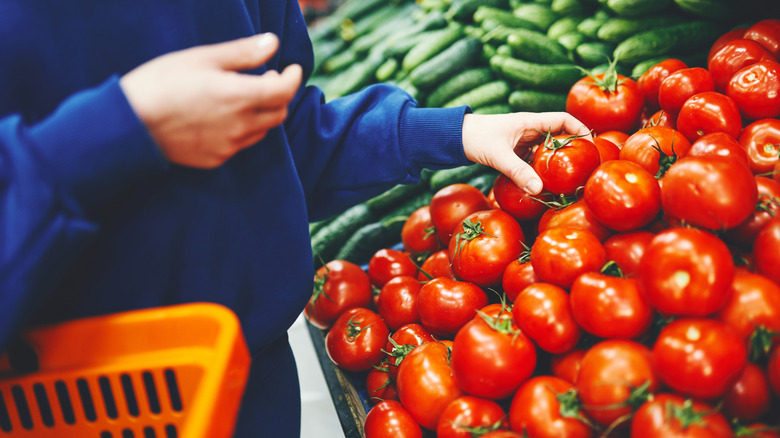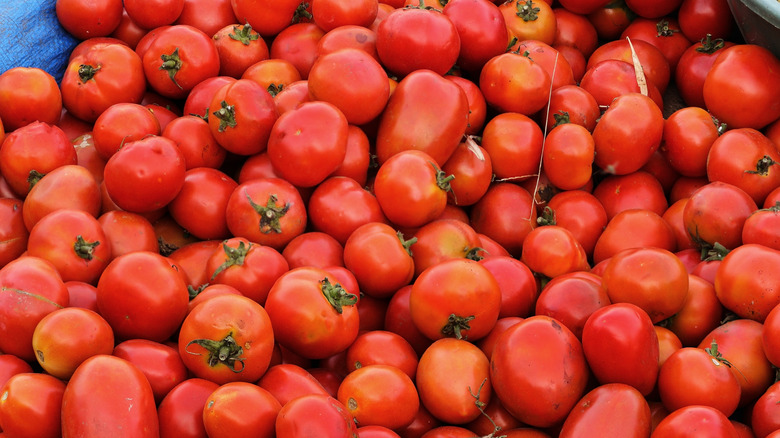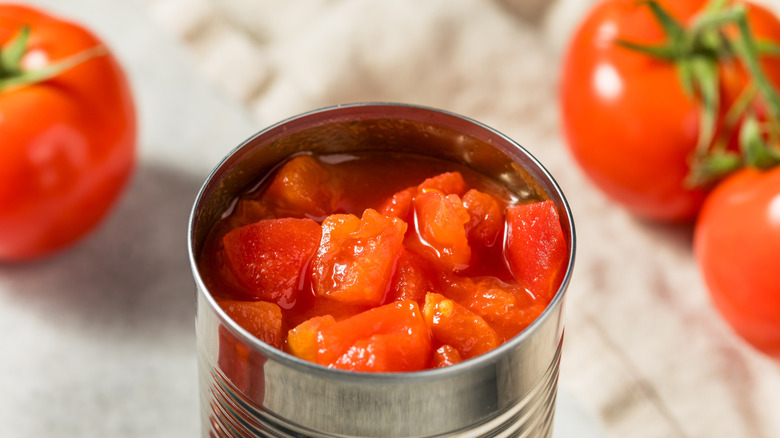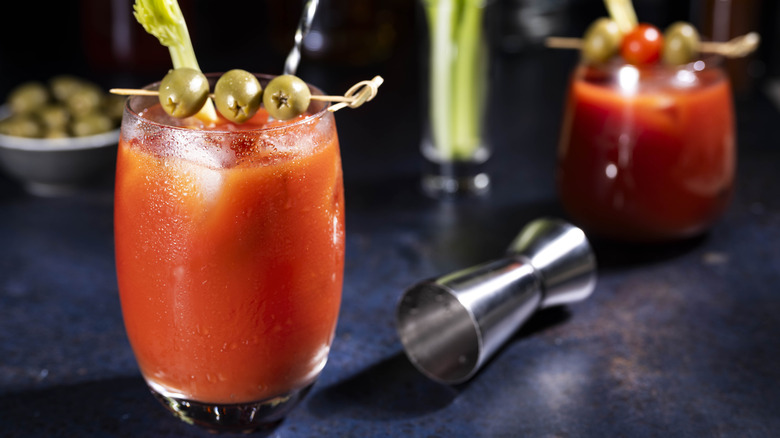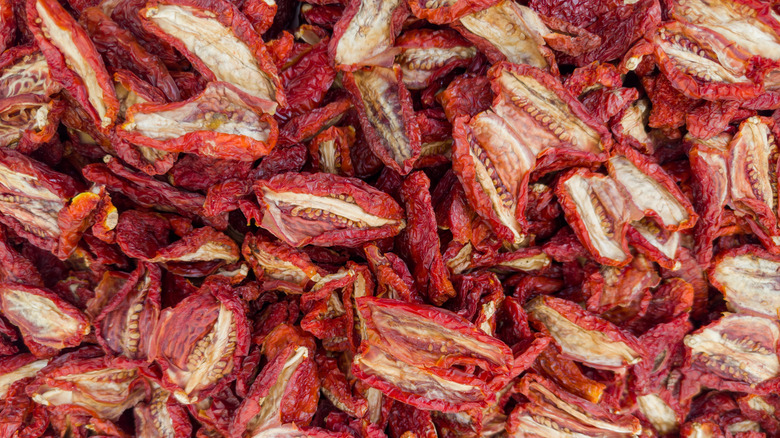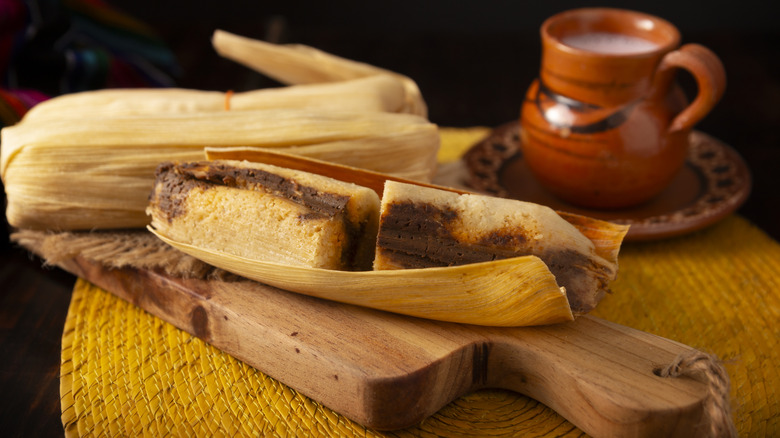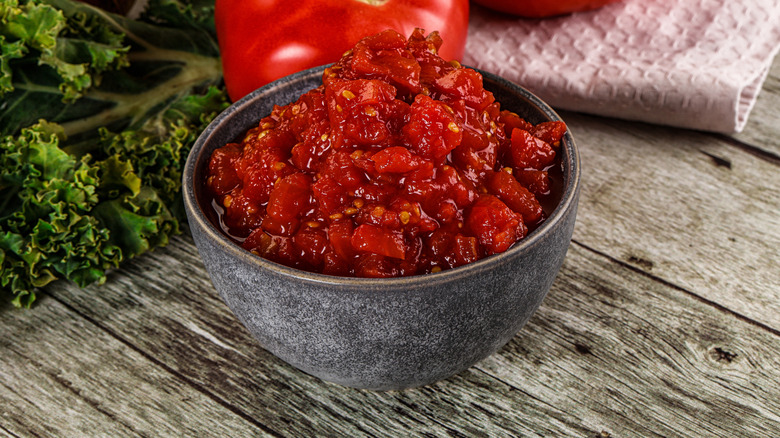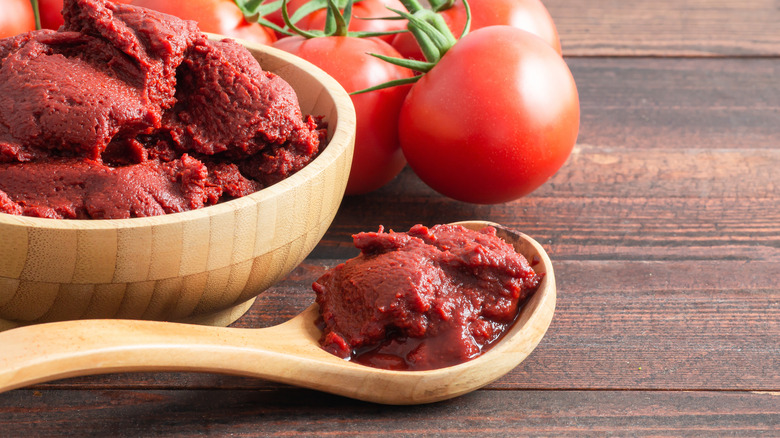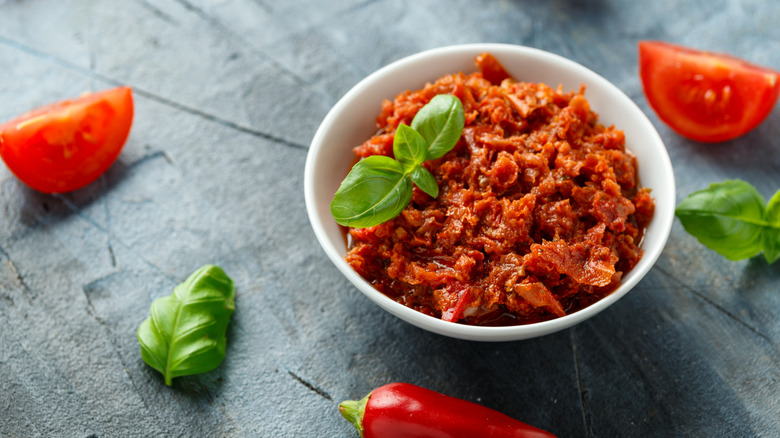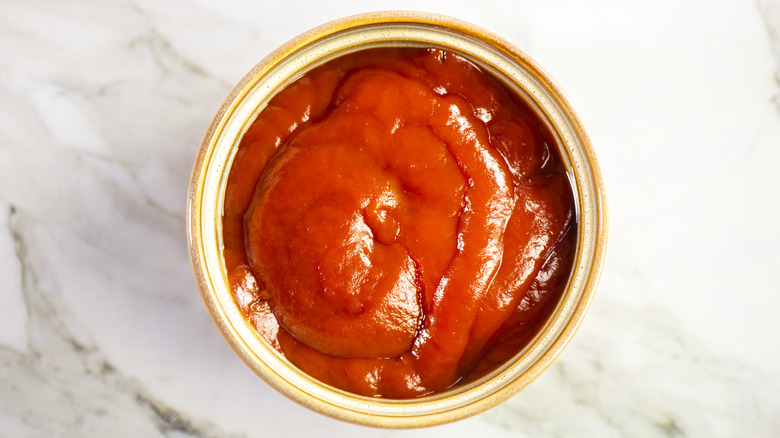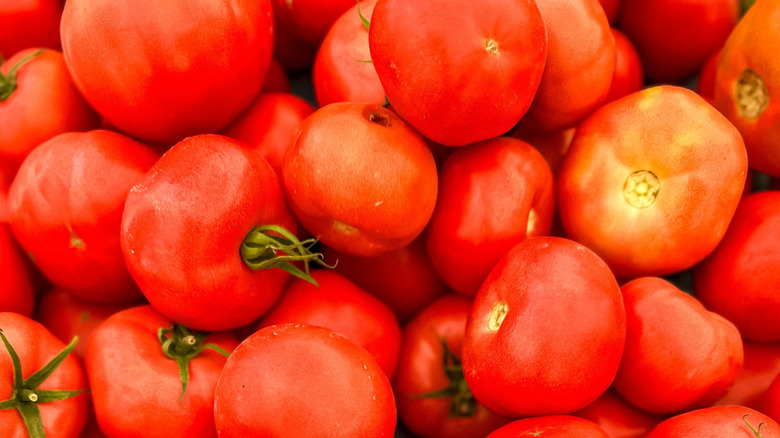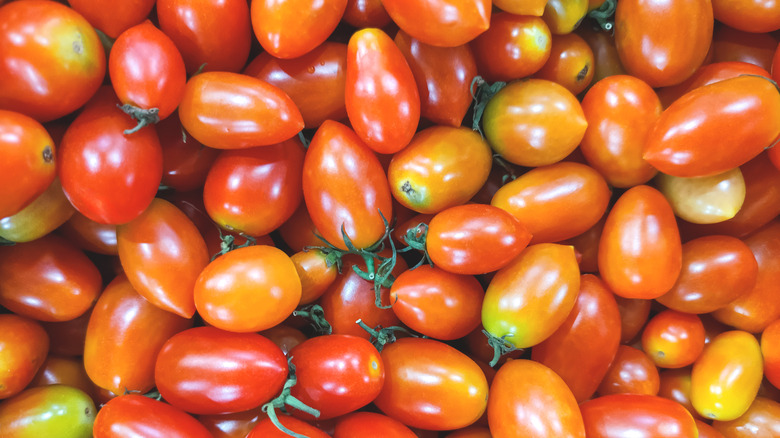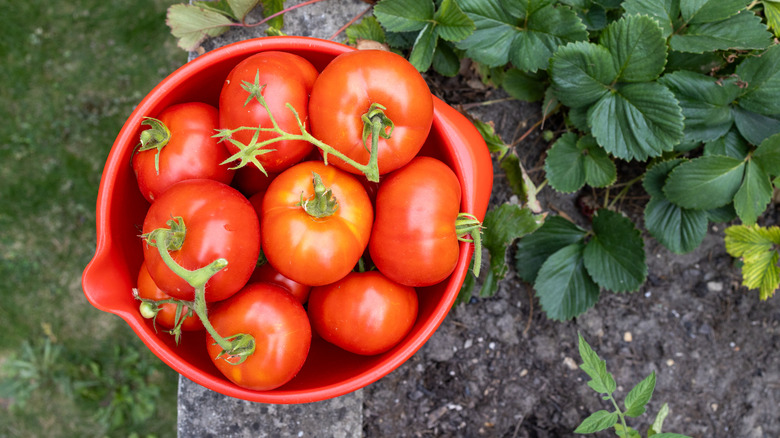12 Biggest Tomato Recalls In History
Tomatoes are a versatile addition to any kitchen. The delicious produce comes in all shapes and sizes, ensuring there is a perfect variety for almost any recipe. From classic kitchen staples like tomato sauce to fresh preparations like salad, tomatoes infuse any dish with mouth-watering flavor. They're also packed with vitamin C, and potassium and have been proven to help lower inflammation and the risk of heart disease — so they're not just delicious, but also nutritious.
And while it's undeniable that tomatoes are good for you, like all food, they are sometimes the subject of a recall that can lead to adverse health effects. Form contamination with bacteria that cause food-borne illnesses to exposure to foreign bodies like plastic, tomato products have been subject to some major recalls in recent history. From fresh tomatoes of all shapes and sizes to canned diced tomatoes to less conventional tomato products like bloody mary mix, the recalls have run the gamut of tomato products.
Williams Farms Repack and Ray & Mascari Inc. tomato recall (2025)
In May 2025, tomatoes were recalled in 14 different states due to exposure to a potentially fatal bacterium: Salmonella. The widespread recall was the result of two different distributors shipping the potentially contaminated tomatoes, Williams Farms Repack and Ray & Mascari Inc.
The FDA labeled both recalls as Class I, their highest risk category, which indicates use of or exposure to the item may cause serious adverse health consequences or death. The Williams Farms Repack recall impacted nine different variations of its prepackaged tomatoes, distributed between April 23 and April 28 to Georgia, North Carolina, and South Carolina. The Ray & Mascari Inc. recall involved its four-packs of vine-ripened tomatoes packaged in clamshell containers sold by Gordon Food Service Stores in Illinois, Indiana, Kentucky, Michigan, Missouri, Mississippi, New York, Ohio, Pennsylvania, Tennessee, and Wisconsin.
Though salmonella is usually associated with raw or undercooked poultry and eggs, it can contaminate other foods, too, and cause abdominal cramps, vomiting, and diarrhea. Though most healthy people recover quickly, it can lead to severe dehydration or other complications that require medical attention. Luckily, as of mid-May 2025, no illnesses tied to this recall had been reported.
Ingomar Packing Co. diced tomato recall (2023)
In early August of 2023, Ingomar Packing Co. announced a voluntary recall of its canned diced tomatoes (just one of many types of canned tomatoes). This California-based "globally recognized ... premium supplier of industrial tomato products" unfortunately distributed tomatoes that had been exposed to foreign materials, with potential plastic pieces in some of the 55-gallon drums of its 1/2″ diced tomatoes and ¾" diced tomatoes. The potentially contaminated tomatoes were distributed to California and Washington state in the United States, and also internationally to Japan.
Though the Class II recall only impacted two products, it resulted in the recall of 4,038 drums, or a whopping 1,855,040 pounds of tomatoes.Class II recalls are the FDA's second-most serious, indicating a situation where exposure to a tainted product may cause temporary or medically reversible adverse health consequences (with a low chance of serious health risks). No incidents or illnesses were ever reported as a result of this recall.
Borsari Food Co. Bloody Mary mix recall (2024)
Fresh and canned tomatoes aren't the only products that have been subject to recalls. In December 2024, Borsari Food Co. announced a voluntary recall another tomato based product: bloody mary mix. This popular mixer is ideal for a fast and convenient cocktail, and it's easy to put your own twist to take store-bought bloody mary mix to the next level. Unfortunately this particular product, which contains soy and anchovies, did not declare these common allergens on the label, leading to the Class II recall due to the labeling issue.
It's estimated that about 1% of the population has a fish or anchovy allergy. Though soy is a more common allergy in children, adults can also suffer from this allergy. Both fish and soy are in the top 10 most common allergies in the United States, making this mislabeling particularly concerning.
The problem was first uncovered during an inspection by the New York State Department of Agriculture because past and future bottles of the mix both clearly declared the allergens. The 32-ounce bottles were distributed within 100 miles of Jamestown, New York, and also through the company's website, leading to a recall across 25 states. No illnesses were ever reported.
Aviator sun-dried tomato halves recall (2023)
In December 2023, Global Vegetable Corp announced a nationwide recall of its 5-pound bags of Aviator sun-dried tomato halves because it was possible they contained undeclared sulfites.
Sulfites are a common food additive that contains sulfur iron, and they help to prevent bacterial growth and also help prevent foods from browning. While they are not uncommon in packaged foods (like sun-dried tomatoes), the issue in this case was that they were not disclosed. Some people have sulfite allergies that can cause reactions similar to those of food allergies, leading to hives, digestive issues, or even, in extreme cases, anaphylactic shock. Like with food allergies, the best treatment for this ailment is to avoid the sulfites to prevent a reaction.
The recall was discovered during routine sampling by the New York State Department of Agriculture after food inspectors discovered the lab analysis did not match the product packaging; the presence of sulfites had not been detected in the test but not disclosed. Luckily, no illnesses or allergic reactions were ever reported during the recall.
Tuscon Tamale Wholesale Co. tamales with tomatoes (2020)
On November 15, 2020, the FDA announced a recall of Tucson Tamale Wholesale Co.'s frozen, ready-to-eat chicken and pork tamale products. The diced tomatoes used in the tamale sauce may have been contaminated with pieces of hard plastic that posed a choking hazard or could cause damage to teeth and gums.
The Arizona-based company first discovered the issue when it found hard pieces of plastic in the cans of diced tomatoes provided by its ingredient supplier. That supplier then initiated a recall with the FDA.
The brand's tamales, which are inspired by the founders' family recipes and rethought with clean, healthy ingredients, are handmade and offered in eight different varieties. With a strong emphasis on top-quality ingredients and a commitment to being gluten- and allergy-free, the tamales seem to be well-liked by consumers with predominantly positive reviews — though nothing can compare to homemade, authentic Mexican tamales. Though the recall is still technically considered active by the FDA as of May 2025, it seems that no injuries were ever reported.
Neil Jones Food Co. diced tomato recall (2020)
In mid-November 2020, The Neil Jones Food Company issued a voluntary recall of its petite diced tomatoes in tomato puree due to the possible presence of hard plastic pieces. The Class II recall initiated a return of 104 cases (or 665 pounds) of the product to prevent choking, dental damage, or other injuries associated with the plastic contamination.
The tomatoes, which had been distributed across Arizona and Utah, were produced under Sysco's Arrezzio brand. With a focus on "Italian staples that will enhance and transform any menu with robust flavors inspired by the very best of Italy," Arrezzio produces a range of products and its catalogue includes pizza dough, dried pasta, olive oil and vinegar, meats and cheeses, and, of course, canned tomatoes (perfect for easy canned tomato hacks). Though it offers a wide range of products, it seems that Arrezzio was involved in only one other recent recall of its cooked beef pizza topping.
7. Conagra Brands Hunts tomato paste recall (2019)
In April 2019, Conagra Brands announced that it was recalling the 6-ounce cans of its Hunt's Tomato Paste No Salt Added due to the possibility of mold. The voluntary recall impacted only a small amount of the product, with a single UPC with a best-by date of October 16, 2020, as part of the voluntary recall.
The brand was first made aware of the problem after receiving calls directly from customers about the moldy tomato paste. The company claimed that the mold was likely caused by damage to the cans during the canning process. Though not all mold is dangerous to ingest, some molds can be toxic, cause respiratory problems, or lead to allergic reactions. Conagra and the FDA urged consumers to throw out any of the tainted tomato paste or return it to the store where it was purchased for a refund to avoid any adverse side effects.
California Sun Dry Foods sun-dried tomato pesto recall (2017)
In May 2017, California Sun Dry Foods announced a recall of its sun-dried tomato pesto due to mislabeling. The back of the jar did not clearly declare two common allergens: milk and almonds.
Tree nut allergies — including almonds — are one of the most common, with some data suggesting that about 1% of the population suffers from this allergy. Though a milk allergy is more common in children than adults, like all allergies, it can lead to severe allergic reactions when exposed.
An employee was the first to discover the discrepancy when filling a display case, alerting the company to the error. The front of the jar was labeled correctly, but the backs of some jars mistakenly had the label for California Sun Dry Foods' other product, sun-dried tomato garlic. The nationwide, voluntary recall impacted stores across the country, requiring them to pull the impacted UPC number from shelves to avoid unintentional allergy exposure.
Conagra Foods Hunts canned tomato sauce recall (2013)
In 2013, Hunts was subject to another tomato recall, this time for its canned tomato sauce. On January 23, 2013, Conagra Foods announced a voluntary recall of its 8-ounce Hunt's Tomato Sauce and Hunt's Tomato Sauce No Salt Added products due to a defect in the inner lining of the cans. The products were distributed across 12 states, mostly in the western U.S. but also including Hawaii.
This recall, however, luckily had no impact on food safety. Instead, the defect could lead cans to swell and splash sauce when opened, creating a bit of a mess. It wouldn't, however, lead to food-borne illnesses or similar issues that are often the cause of widespread product recalls. The product impacted only a few products with specific best-by dates for both the tomato sauce and no-salt-added tomato sauce, accounting for just a fraction of Hunts' wide range of canned products. Those who were concerned could return their canned goods to the store where they were purchased — or opt to make homemade tomato sauce instead.
Cross Valley Farms whole tomato recall (2012)
In July 2012, Combs Produce recalled the Cross Valley Farms and Packer Label whole tomatoes sent to two Texas distribution centers because of potential E. coli contamination. The tainted tomatoes were distributed over the course of a few weeks between June 27 and July 7, leading to the Class I recall of two lot codes. A Class I FDA recall denotes that the recalled product poses the highest risk, indicating that there is a reasonable probability that consuming or using the product will lead to serious health consequences — or, in extreme cases, even death.
Though just the equipment (and not the tomatoes themselves) tested positive for E. coli, the presence of this bacterium could still have potentially transferred to the produce and led to severe food-borne illness. Symptoms of an E. coli infection include stomach pain, digestive upset, and in extreme cases, kidney damage or serious illness. E. coli has also been the culprit in a number of fast food chain food poisoning outbreaks over the years.
Grape tomato recall (2011)
A widespread grape tomato recall (not to be confused with cherry tomatoes) took place in April of 2011, impacting consumers across the country. First, on April 11, Six L's Packing recalled a specific lot of its grape tomatoes because they were possibly contaminated with salmonella. This recall had a cascading impact, setting off a chain of recalls from other companies and products using the contaminated tomatoes.
First, Taylor Farms Pacific Inc. then recalled several of its ready-made salad kits a few days later. This recall affected 22,000 pounds of salad including their chef, Cobb, and BLT salad varieties. Mastronardi Produce of Ontario, Northeast Products Inc. of Plainville, CT, Mann Packing Co. Inc. of California, and Del Monte Fresh Produce of Florida all followed suit over the course of the next few days, issuing recalls for products that contained the potentially tainted grape tomatoes. Major retailers like Safeway and Trader Joe's also issued recalls for tomato products because these products were supplied by some of the same distributors.
Fresh red tomato recall (2008)
May 2008 was witness to one of the largest recalls in U.S. history. The FDA first issued a warning on June 3 for New Mexico and Texas, recalling all raw, red tomatoes including roma, plum, and beefsteak (also some of the best tomatoes varieties for making salsa) . A few days later on June 7, they expanded the recall nationwide, warning of an outbreak of salmonella entertidis and salmonella Saintpaul, an uncommon and severe form of the bacteria. The recall was amid 145 cases and over 20 hospitalizations from the food-borne illness across 16 states. As time went on, the outbreak continued to grow as more cases were reported.
In mid-July, the FDA lifted the recall on tomatoes — despite the fact that they still had not identified the source of the widespread contamination. Eventually, the agency determined that the salmonella was spreading due to contaminated jalapeño and serrano peppers (with tomatoes never being the true culprit).
This salmonella outbreak and subsequent produce recall is considered one of the most expensive in U.S. history, costing the industry over $250 million dollars. Some of the farmers even sued the government to be compensated for their losses and reimburse them the cost of the lost 2008 crop.
